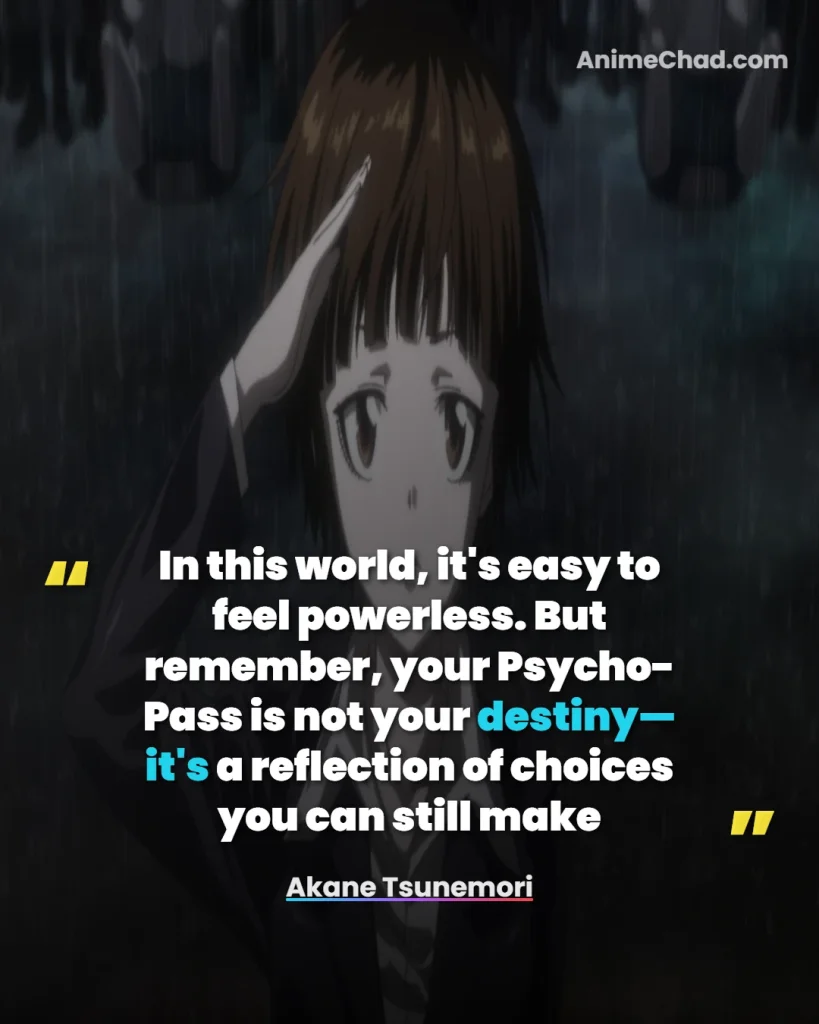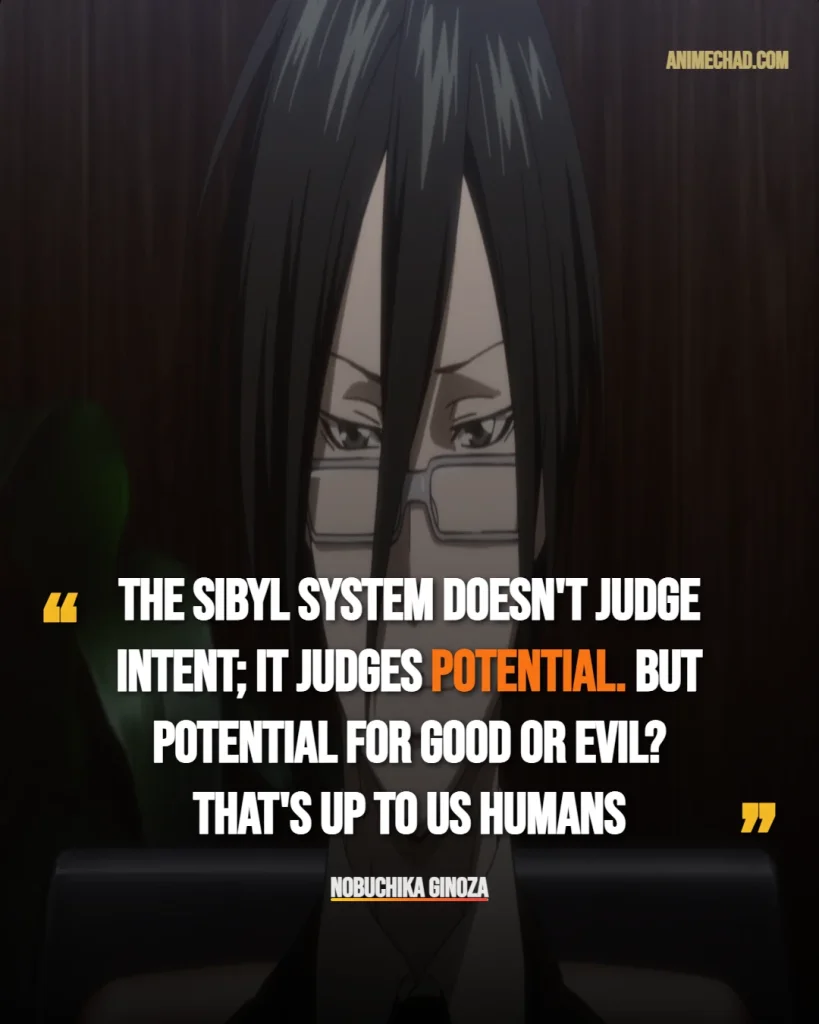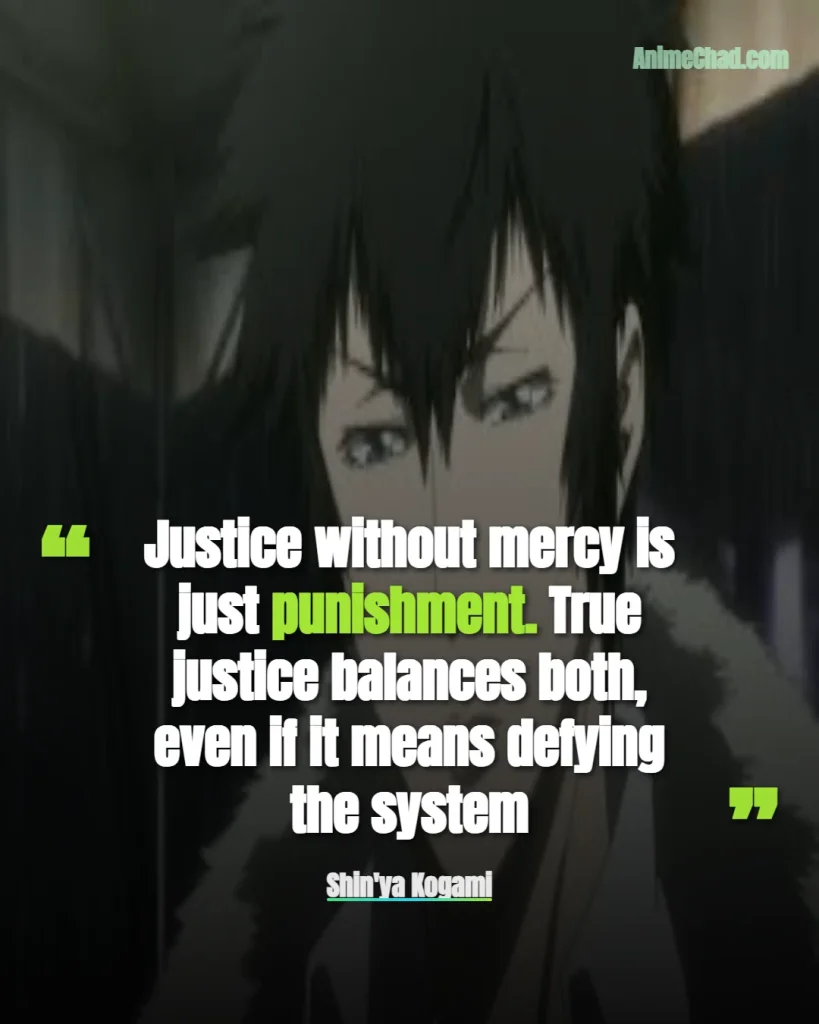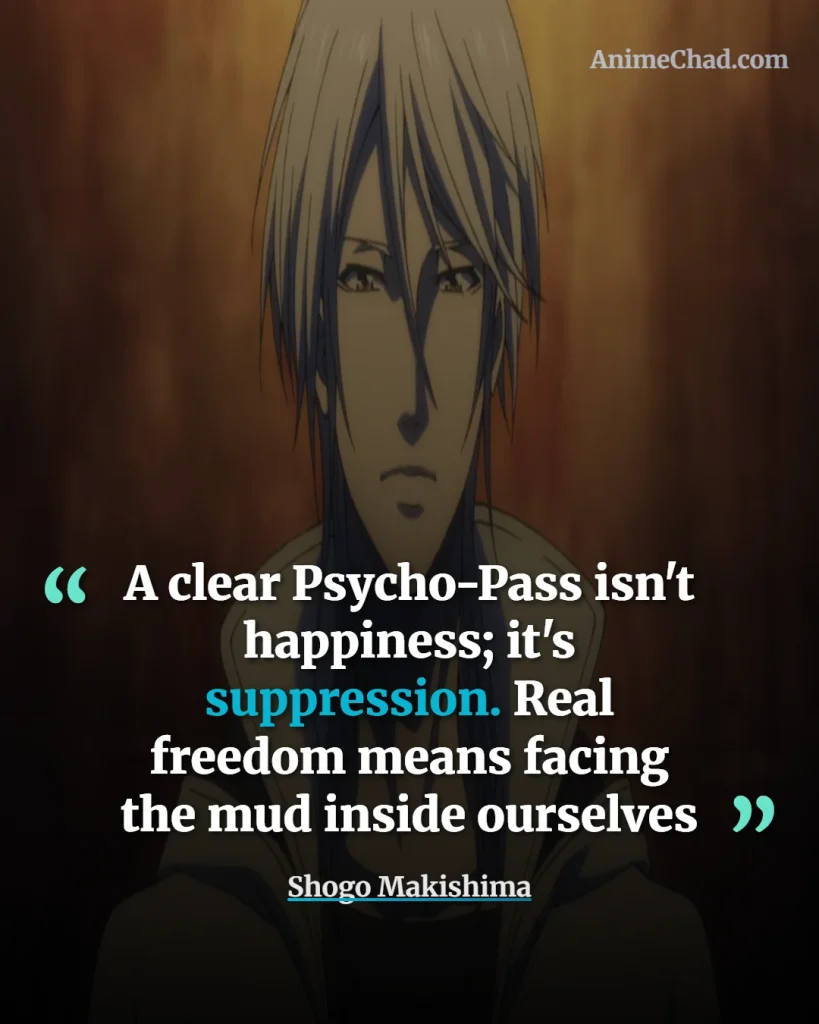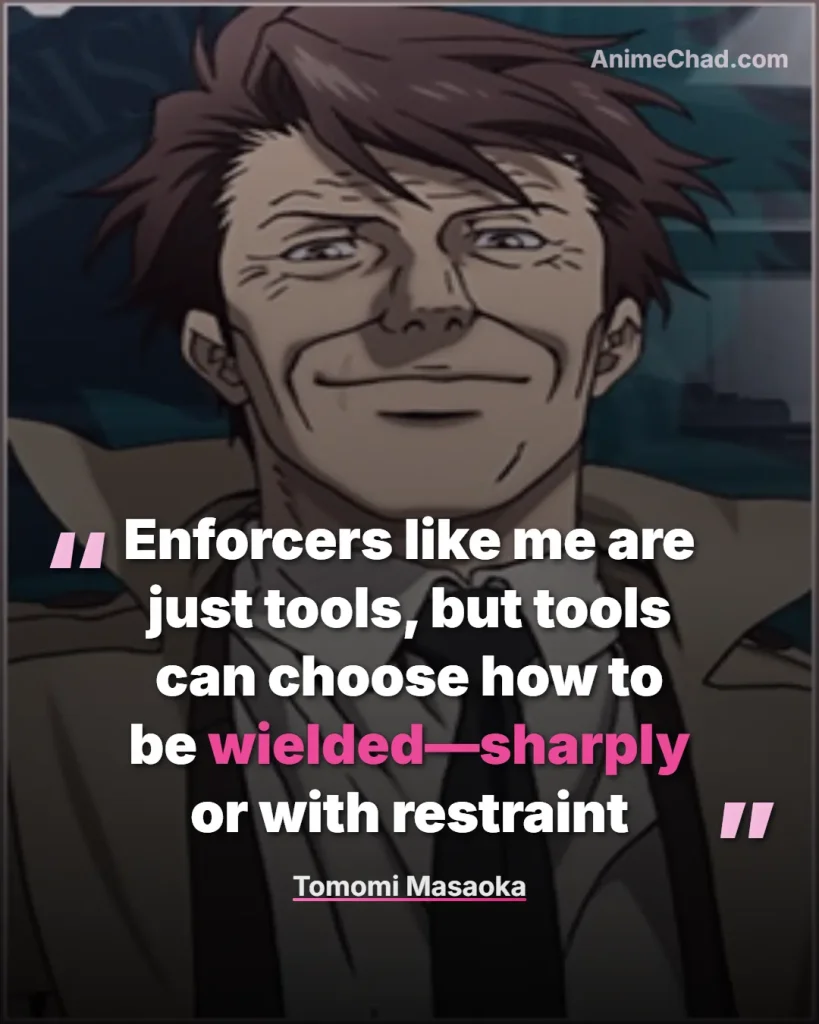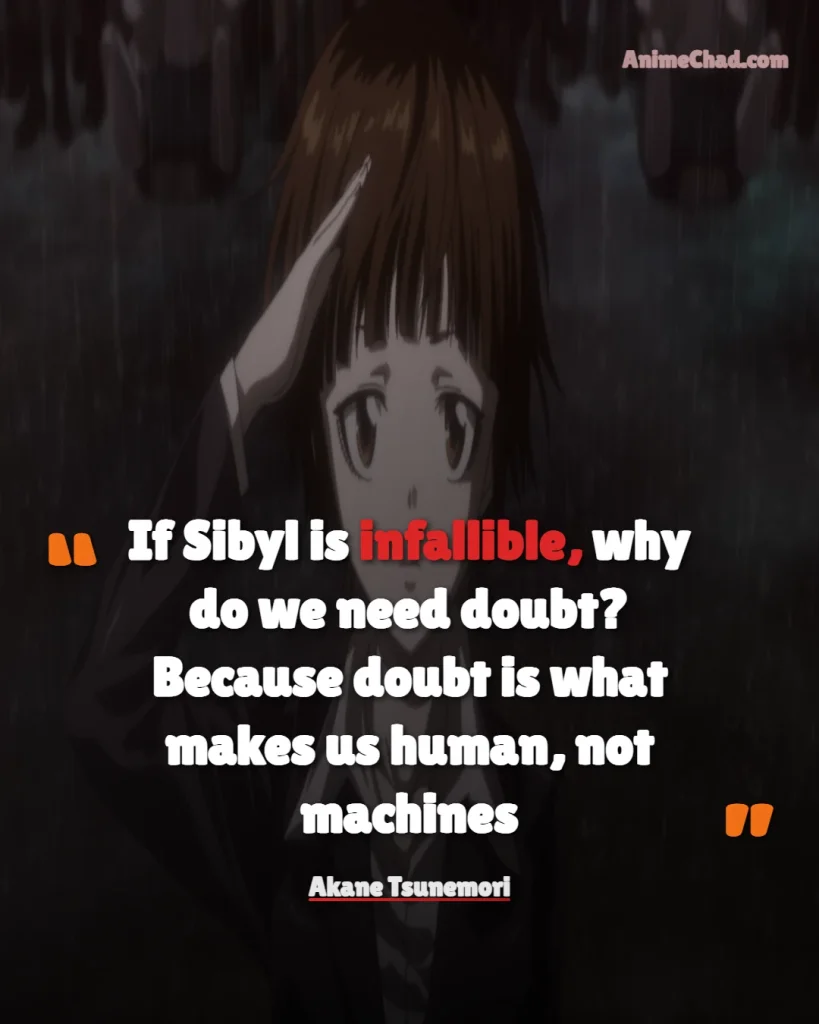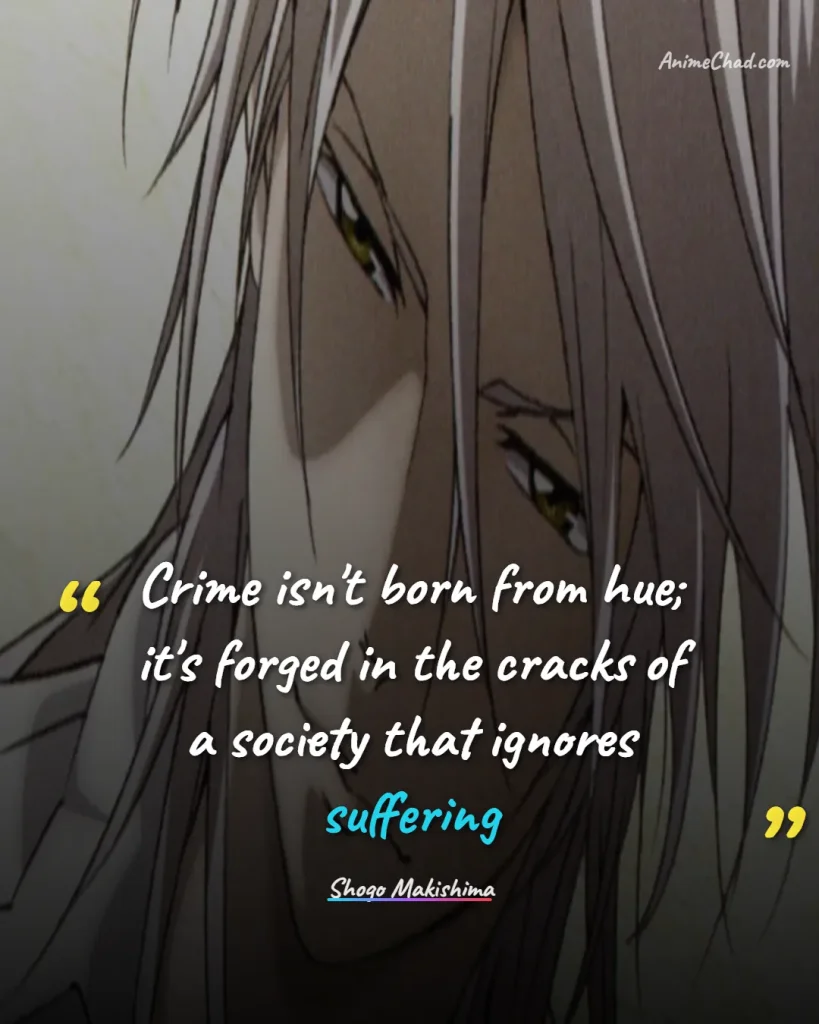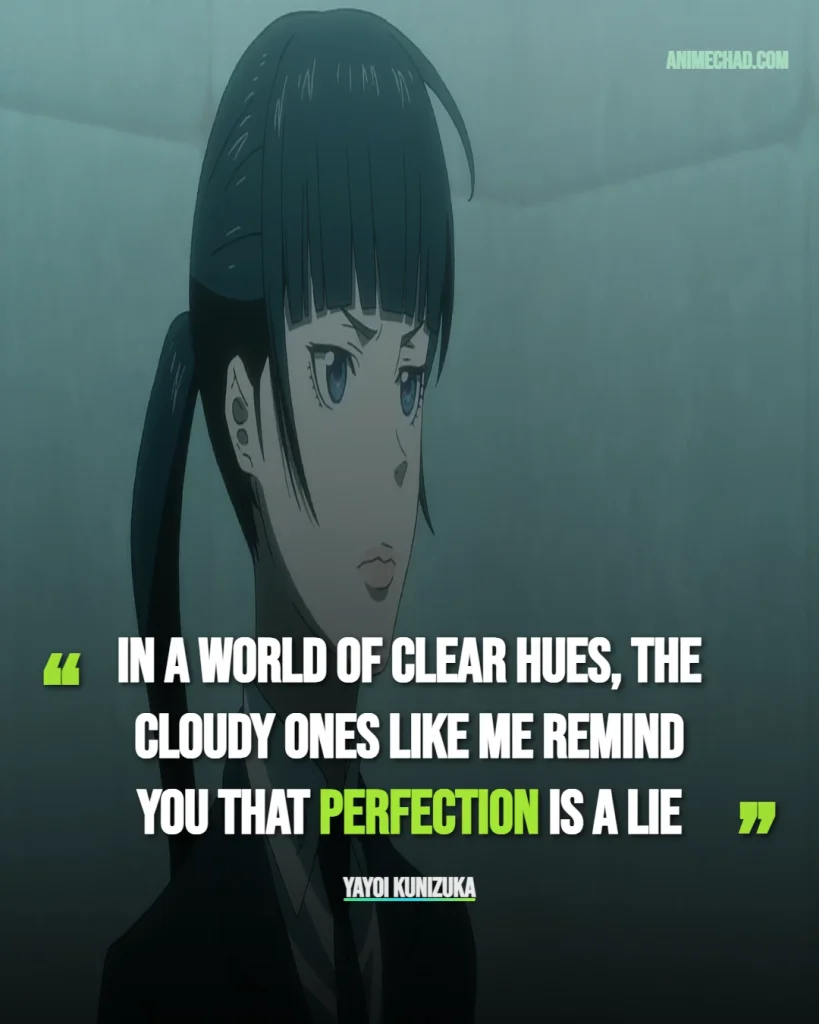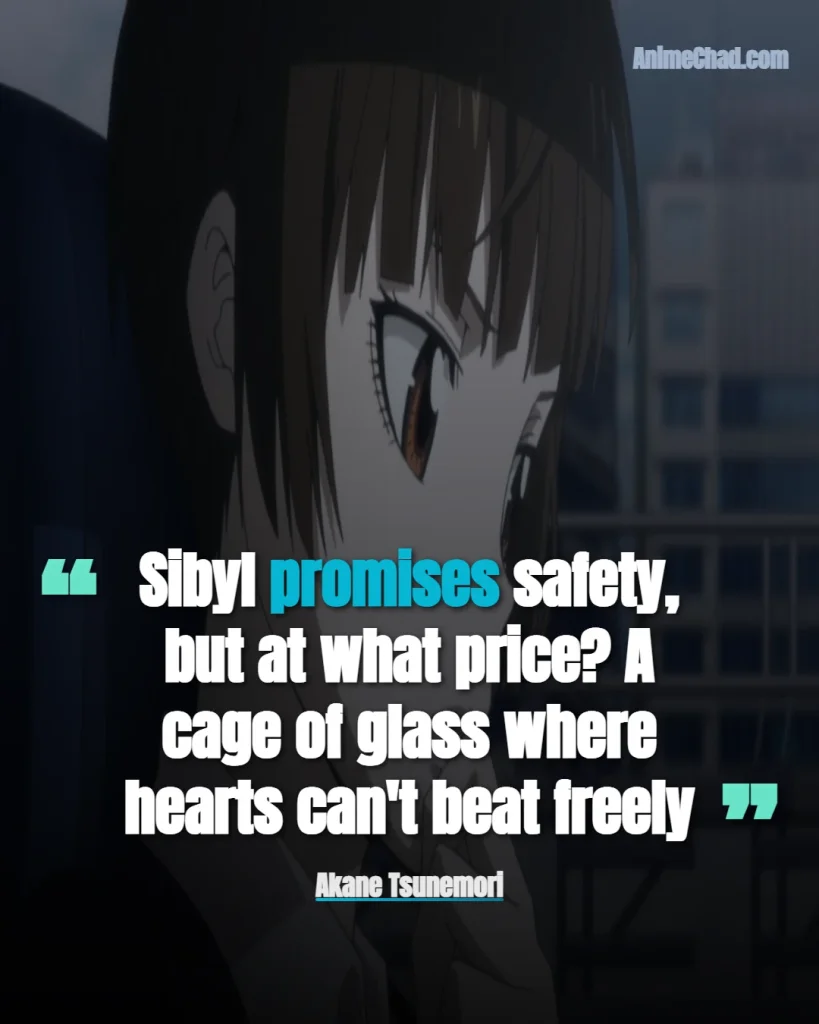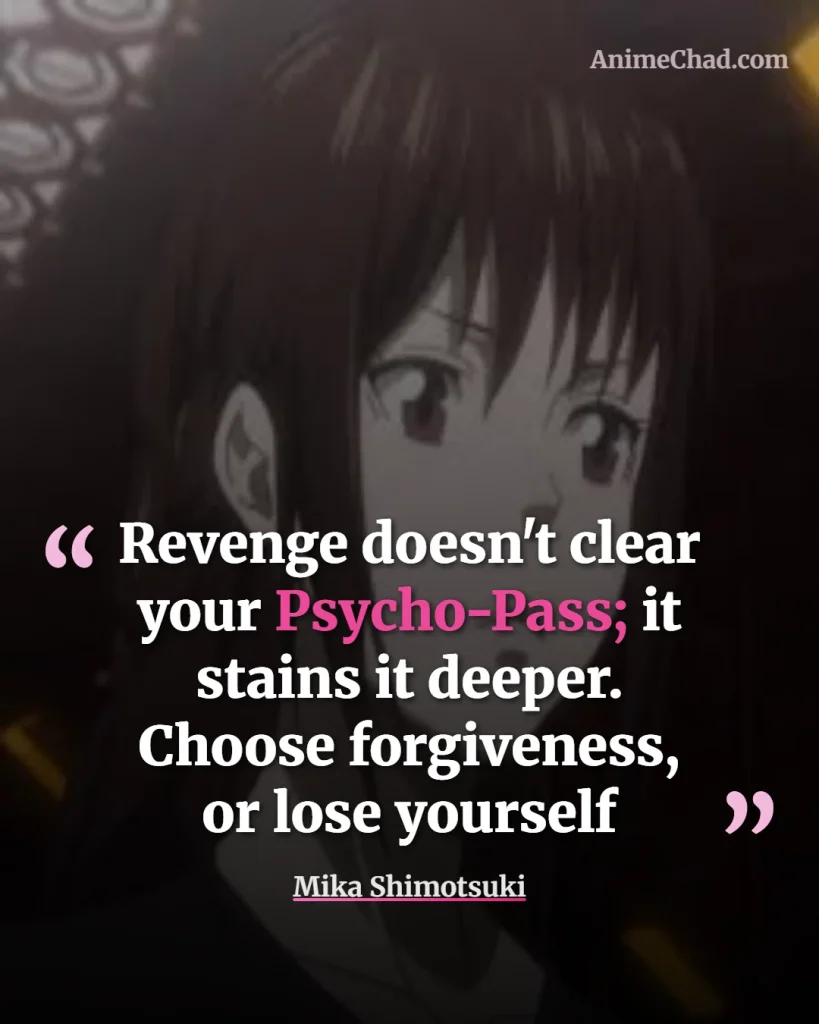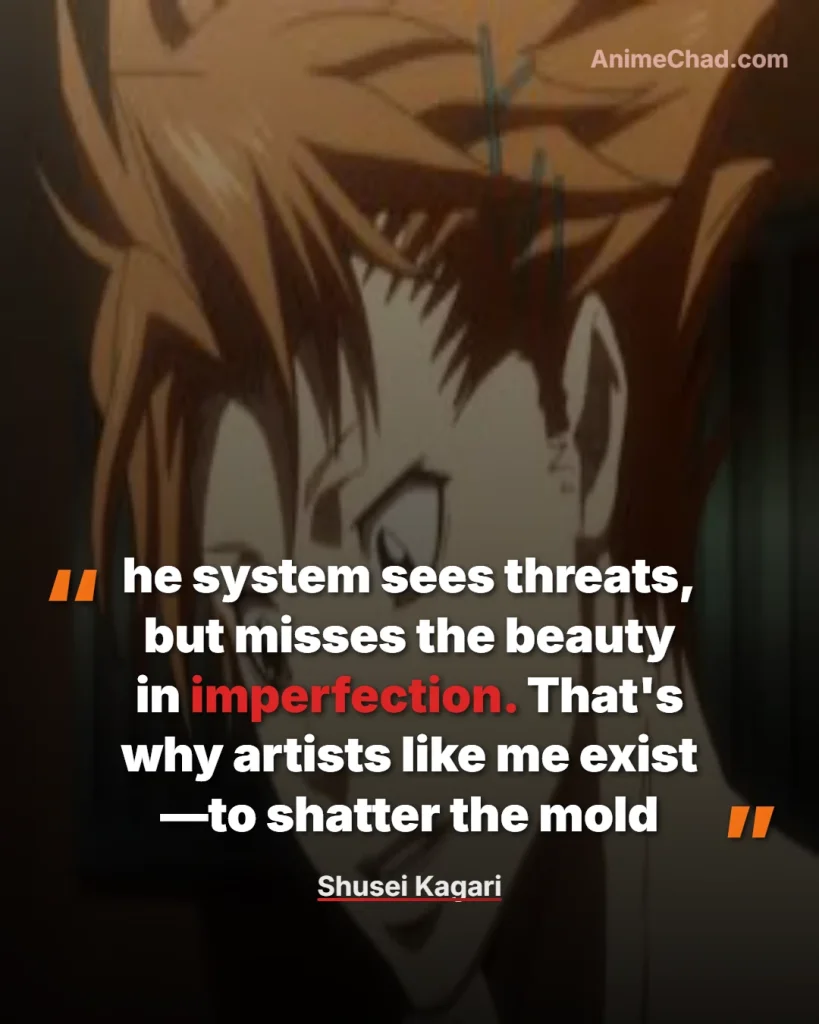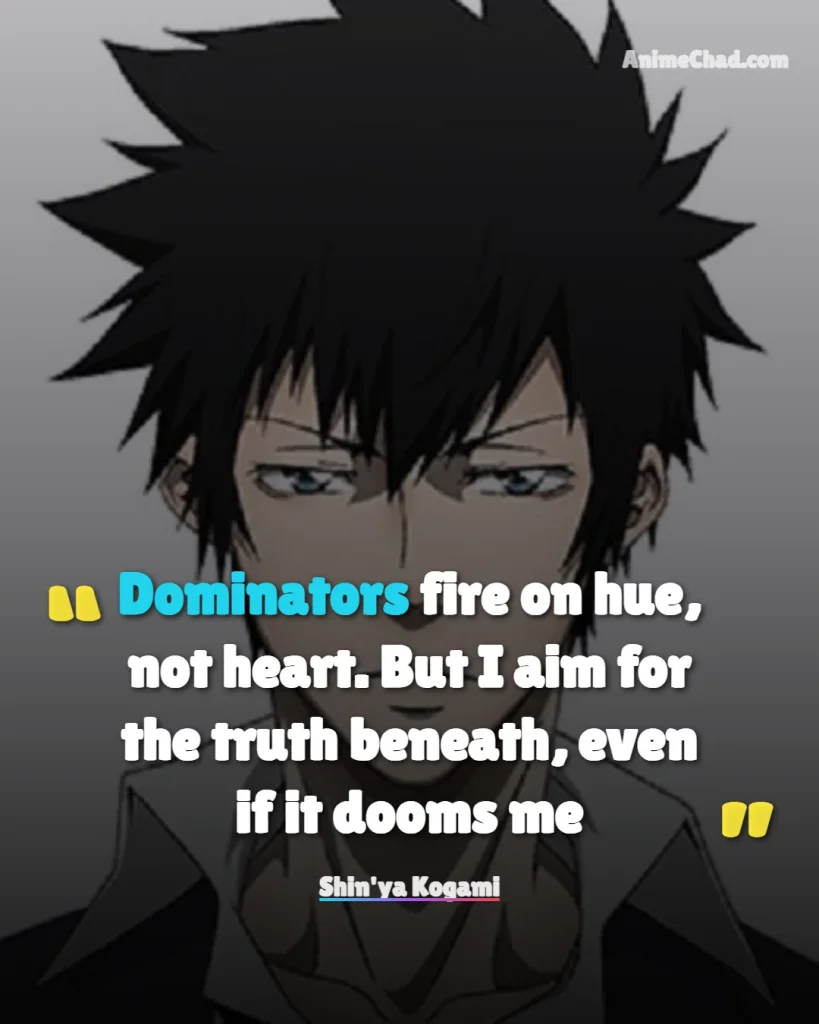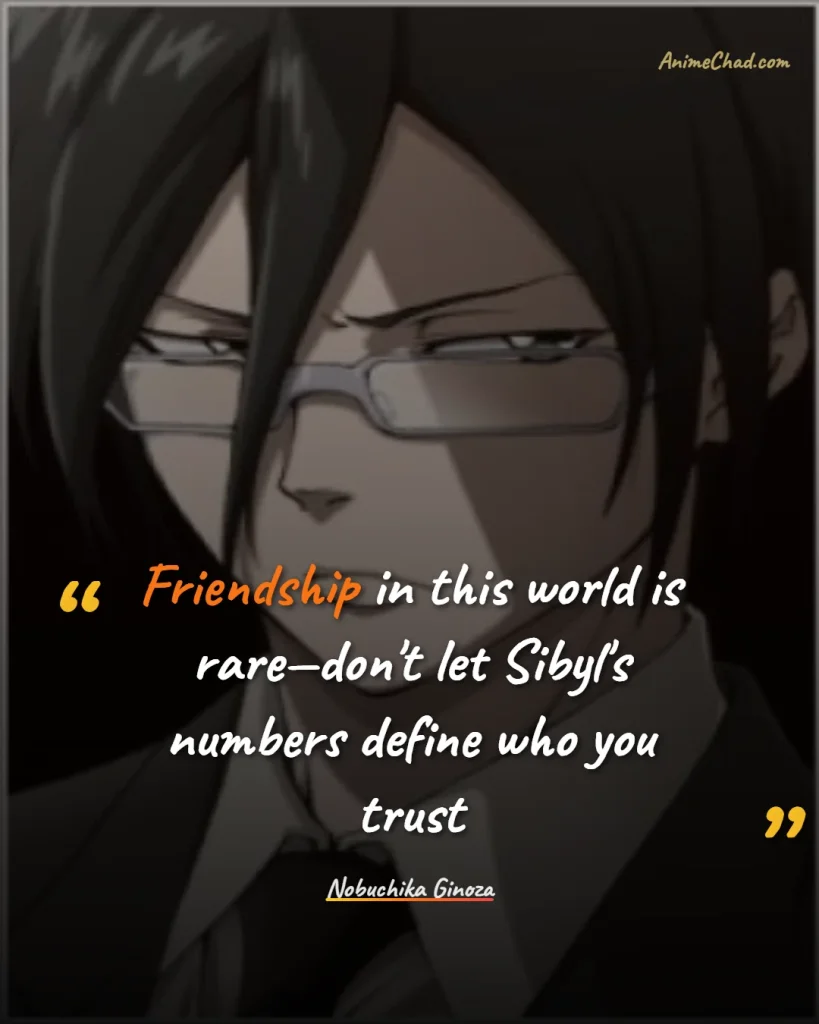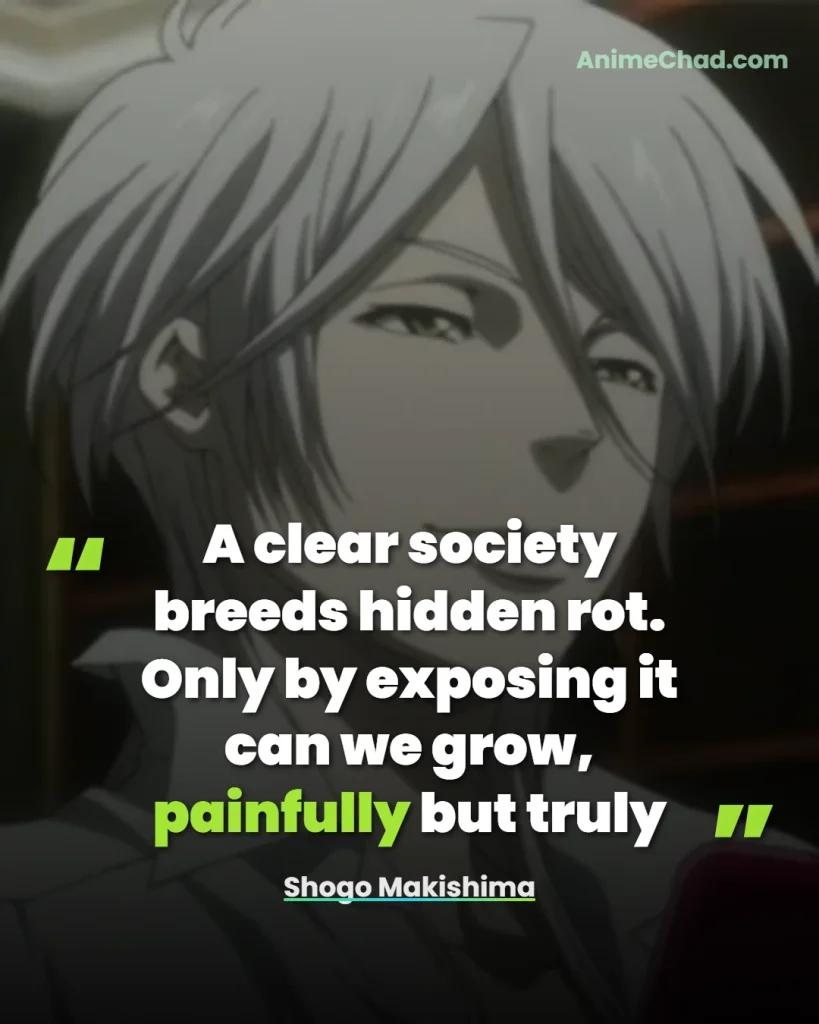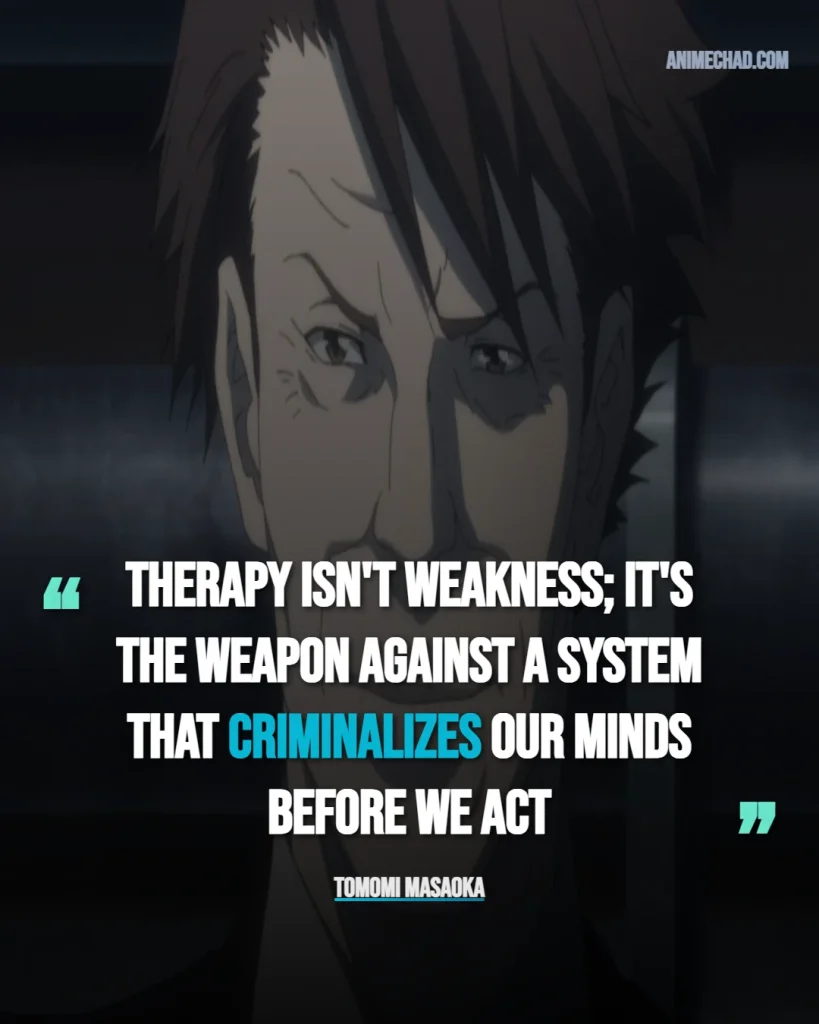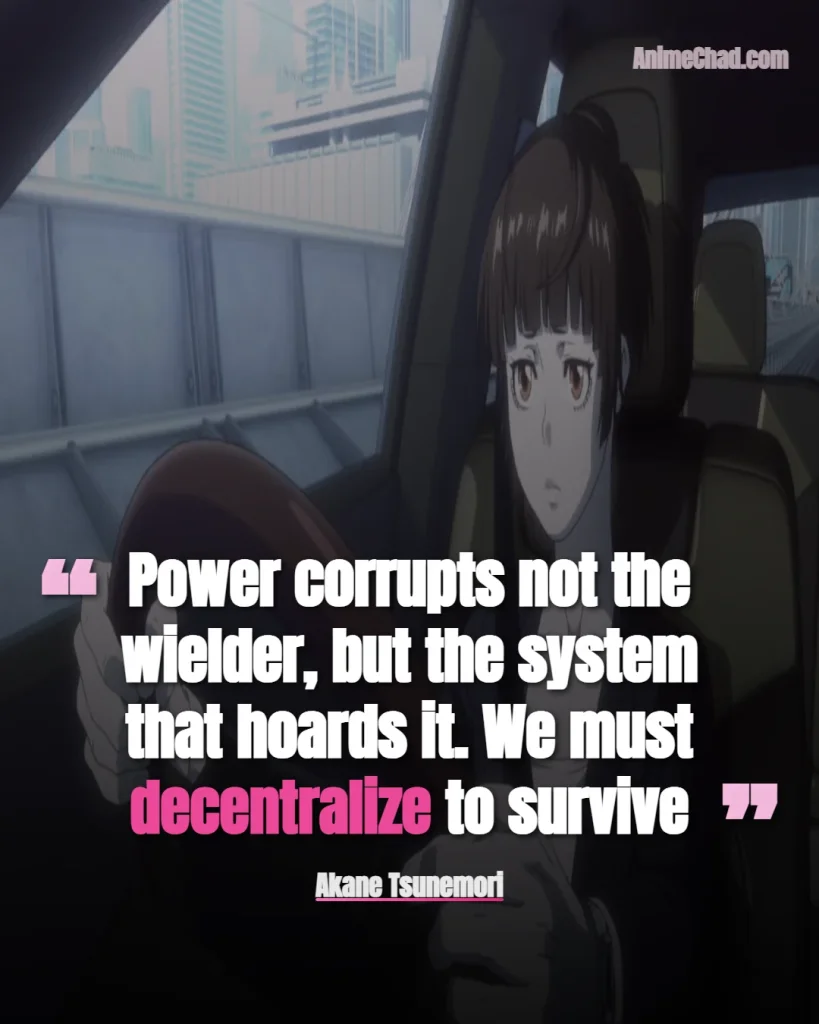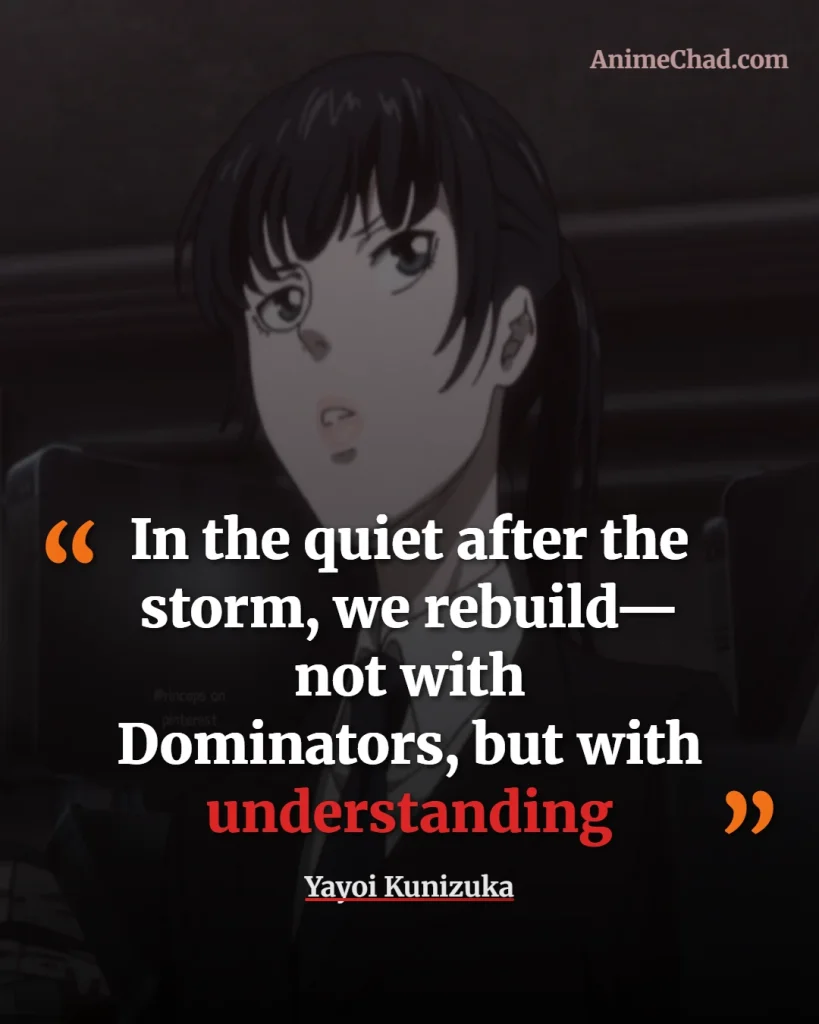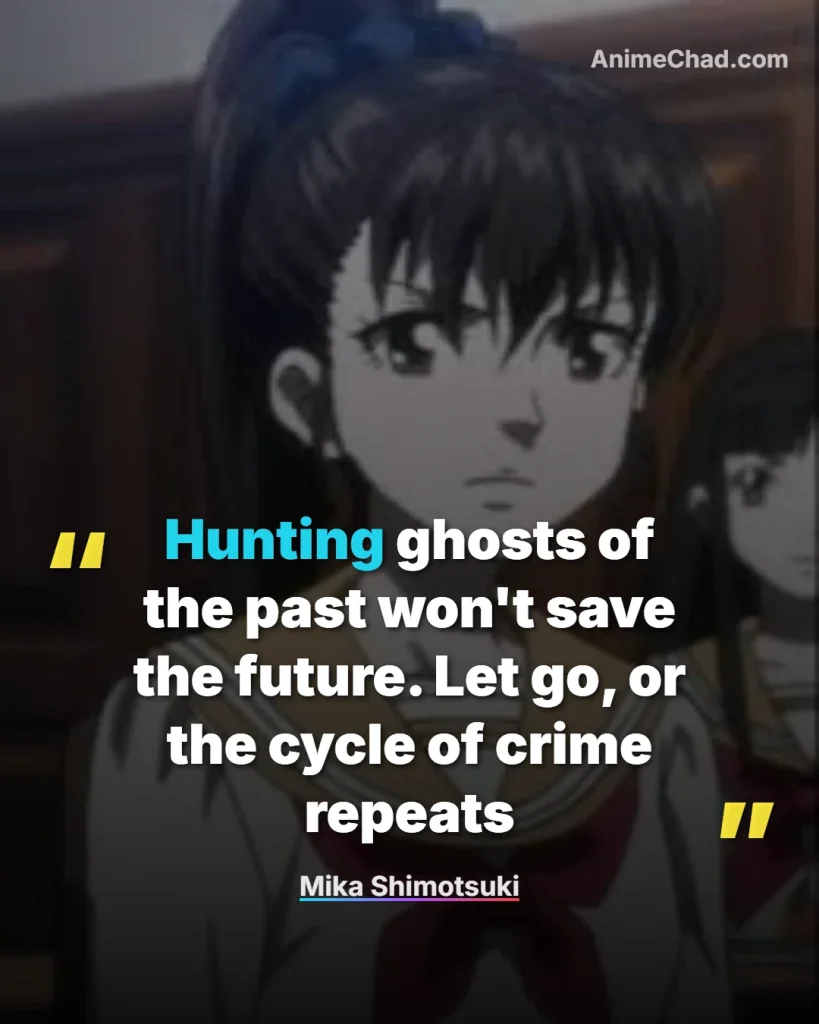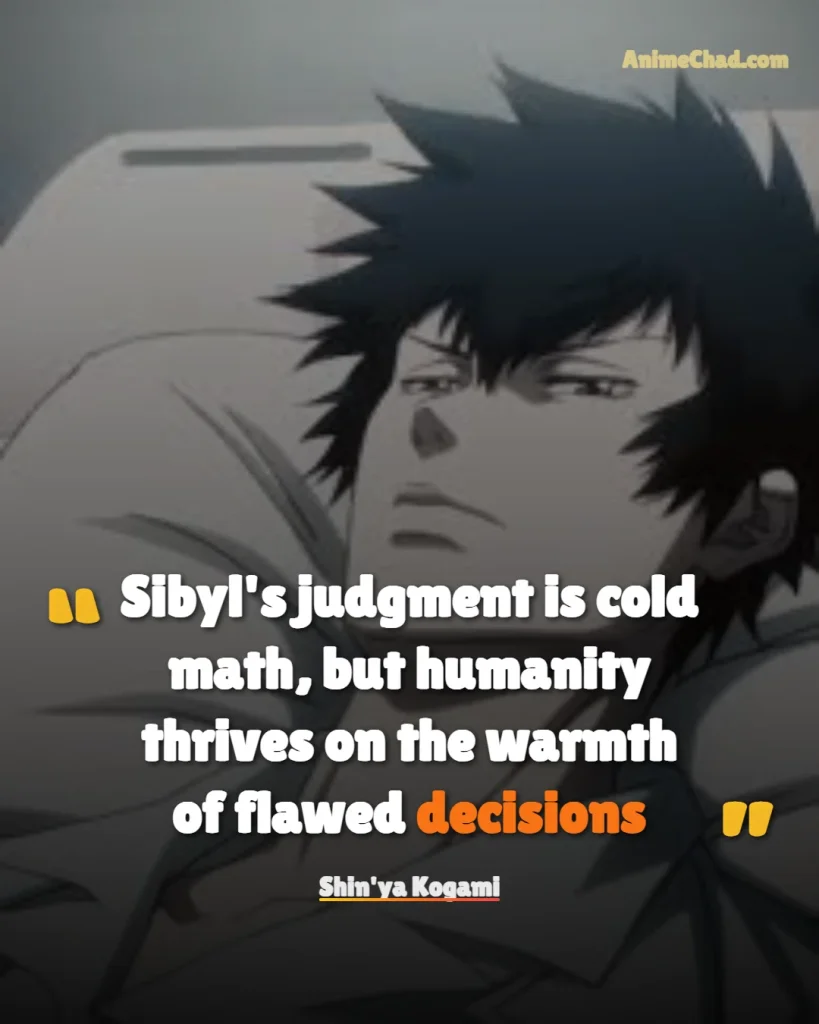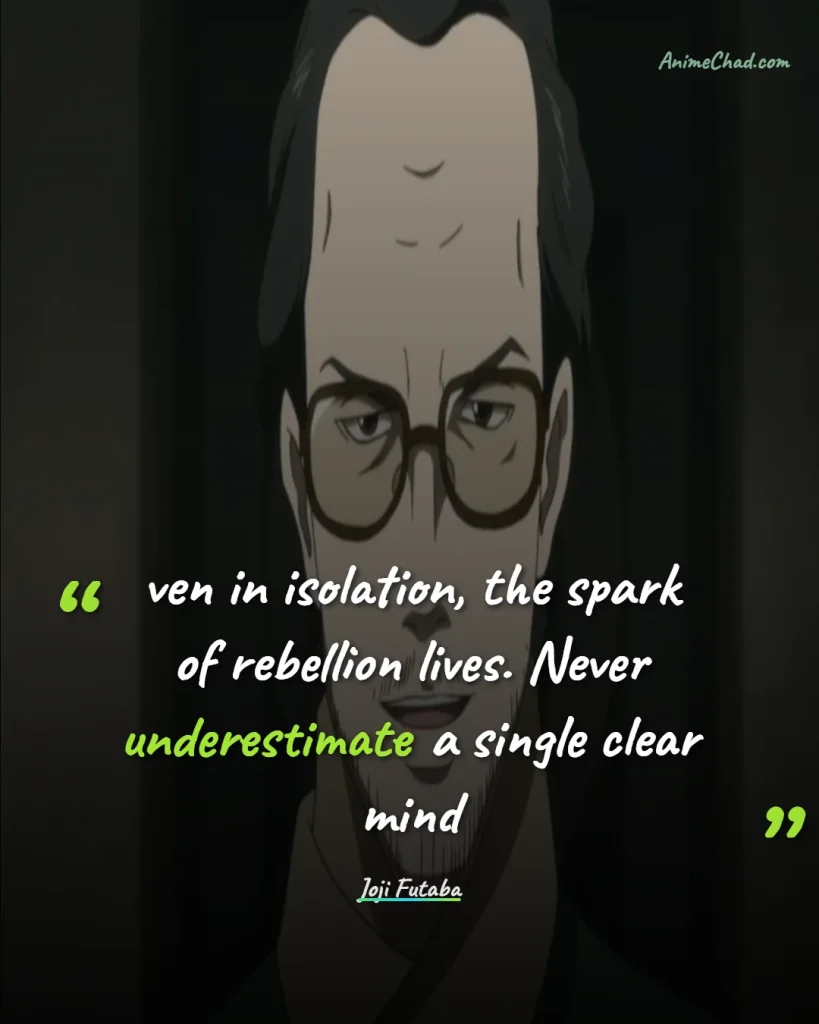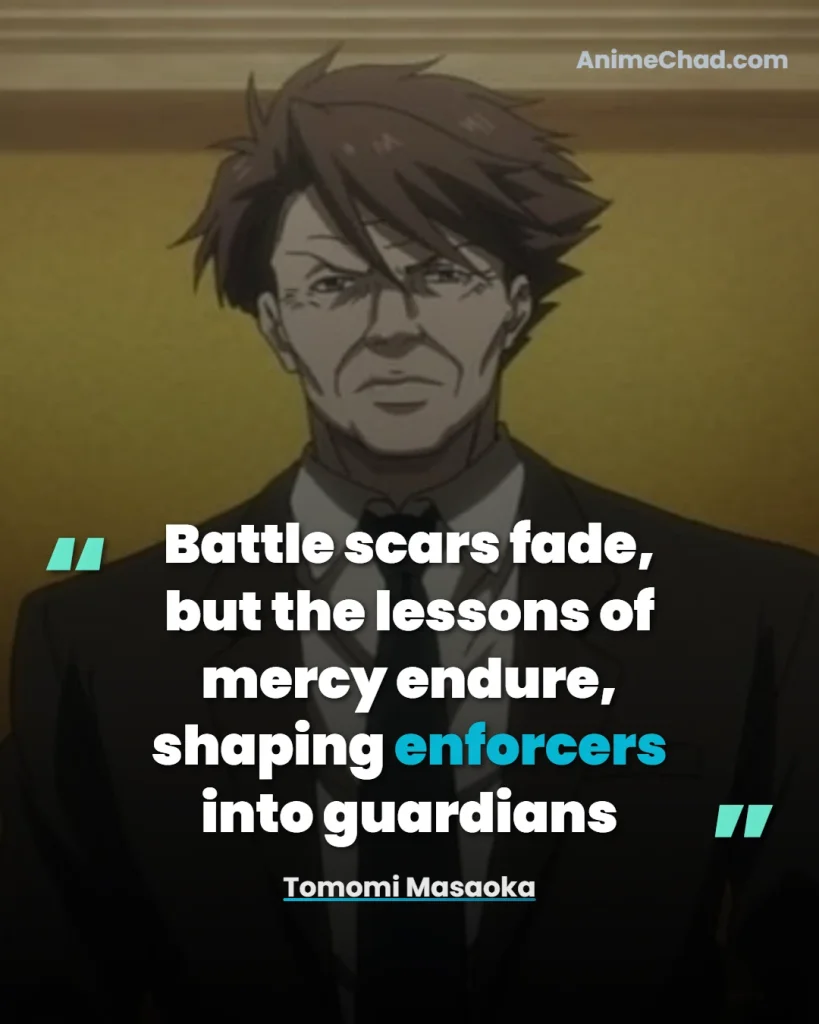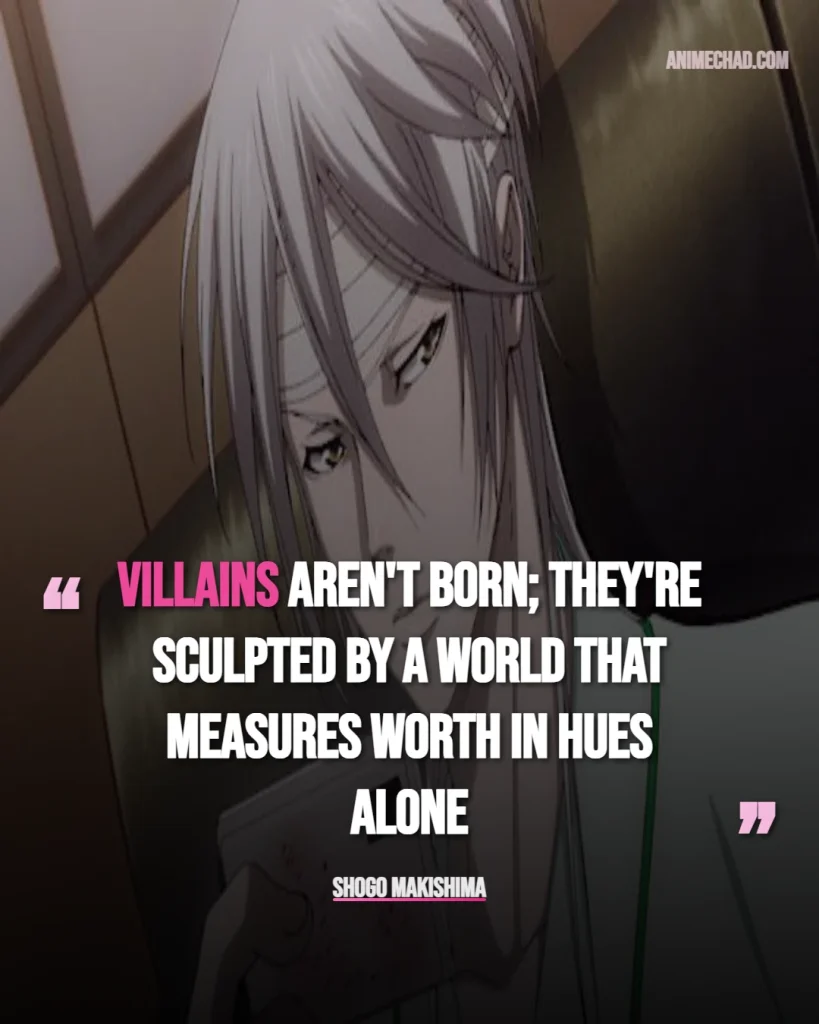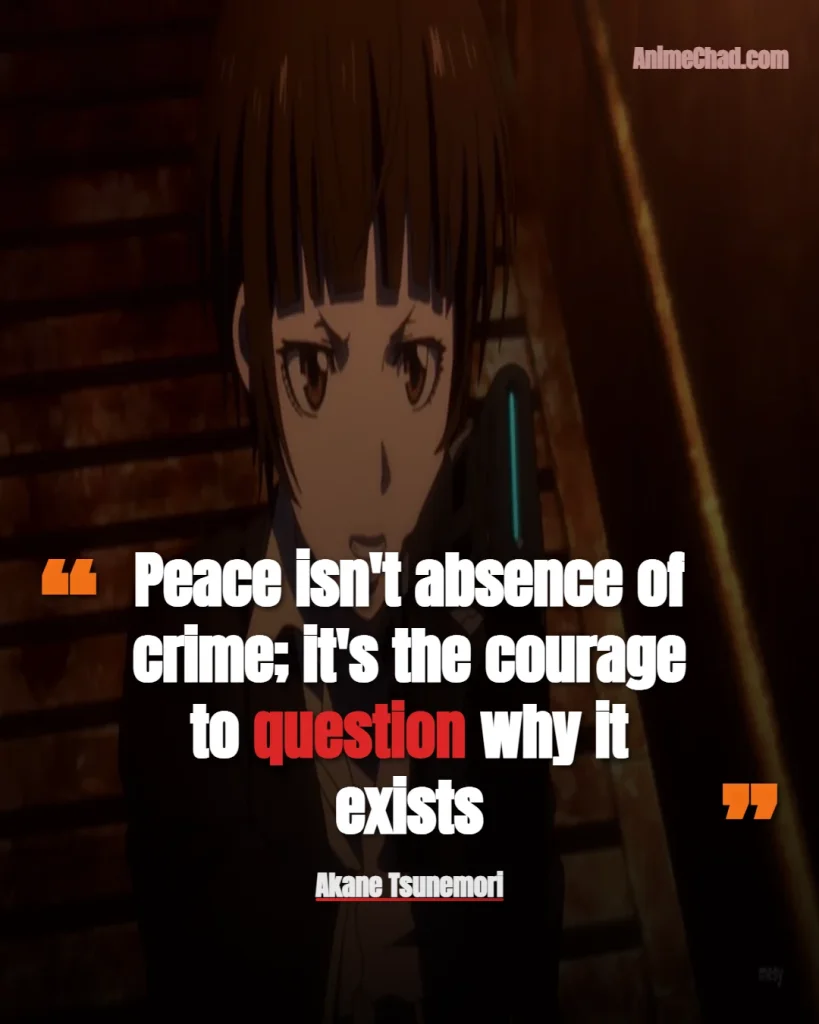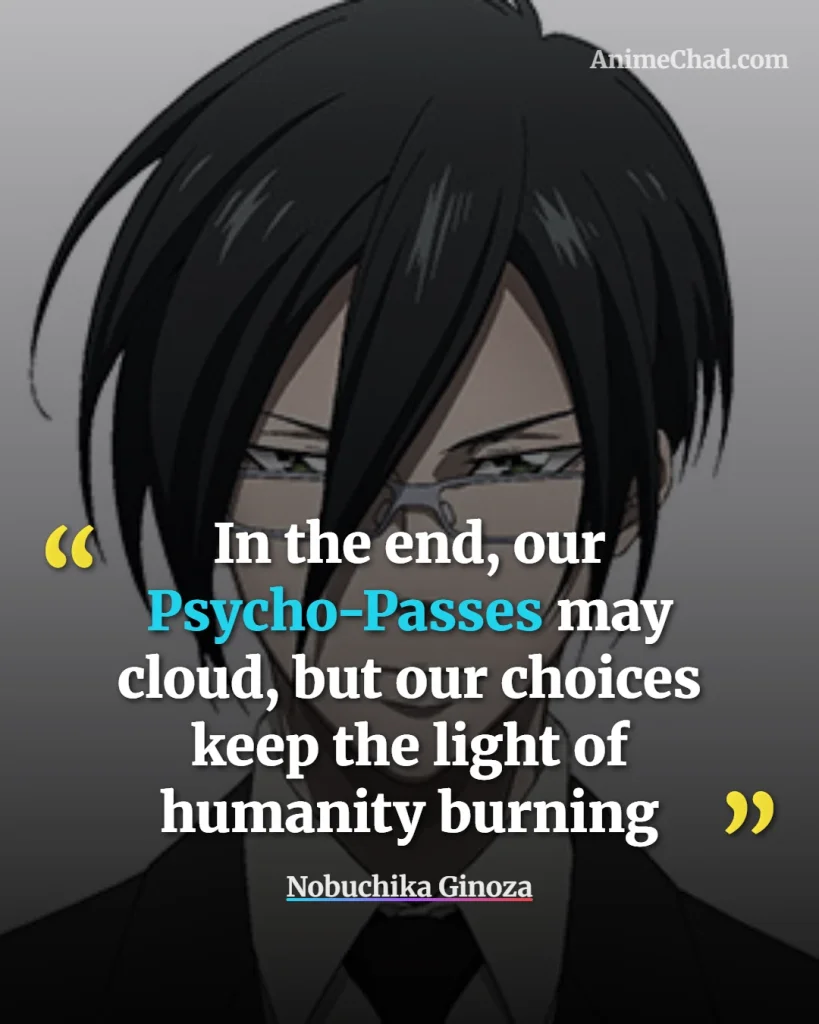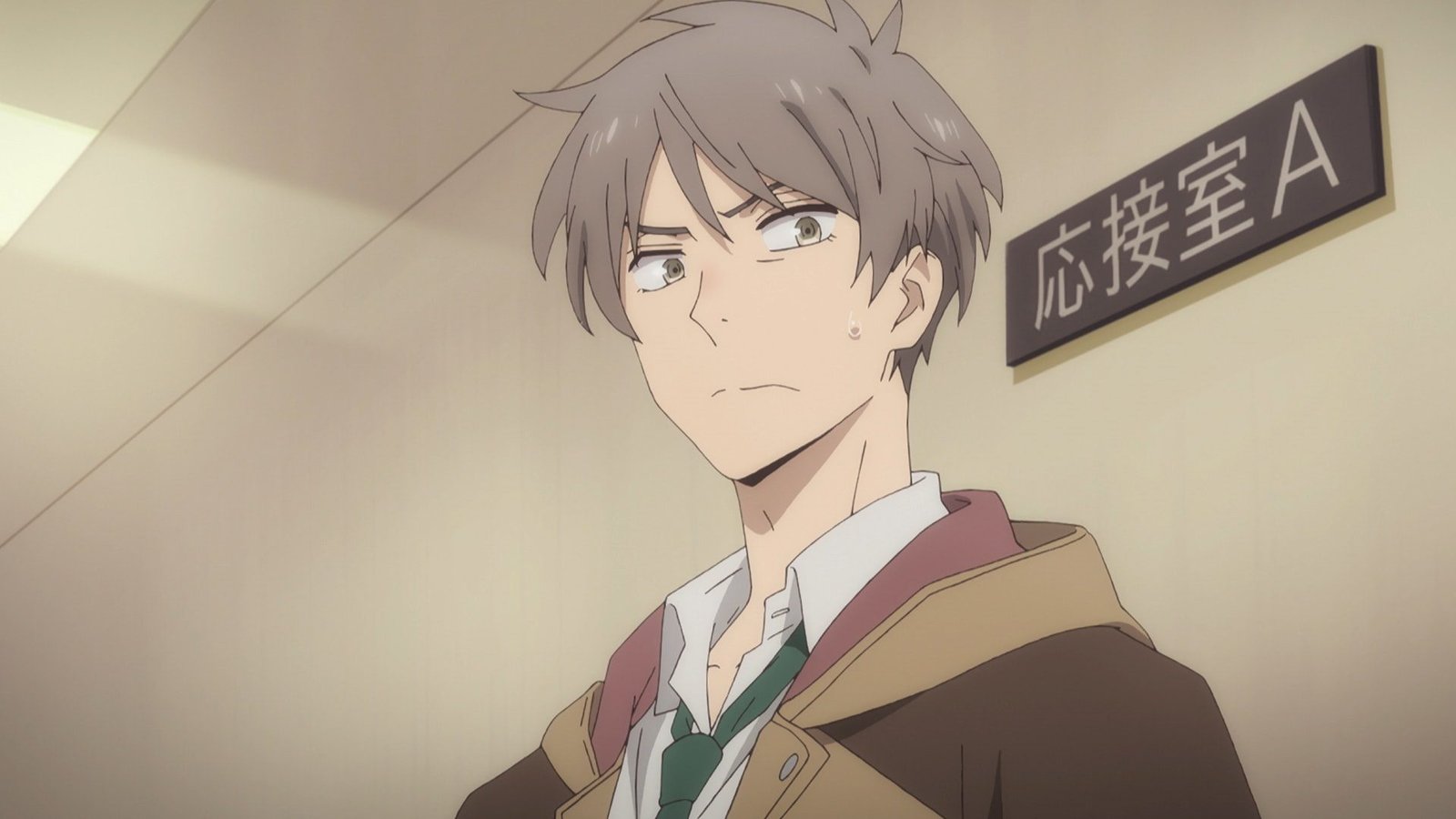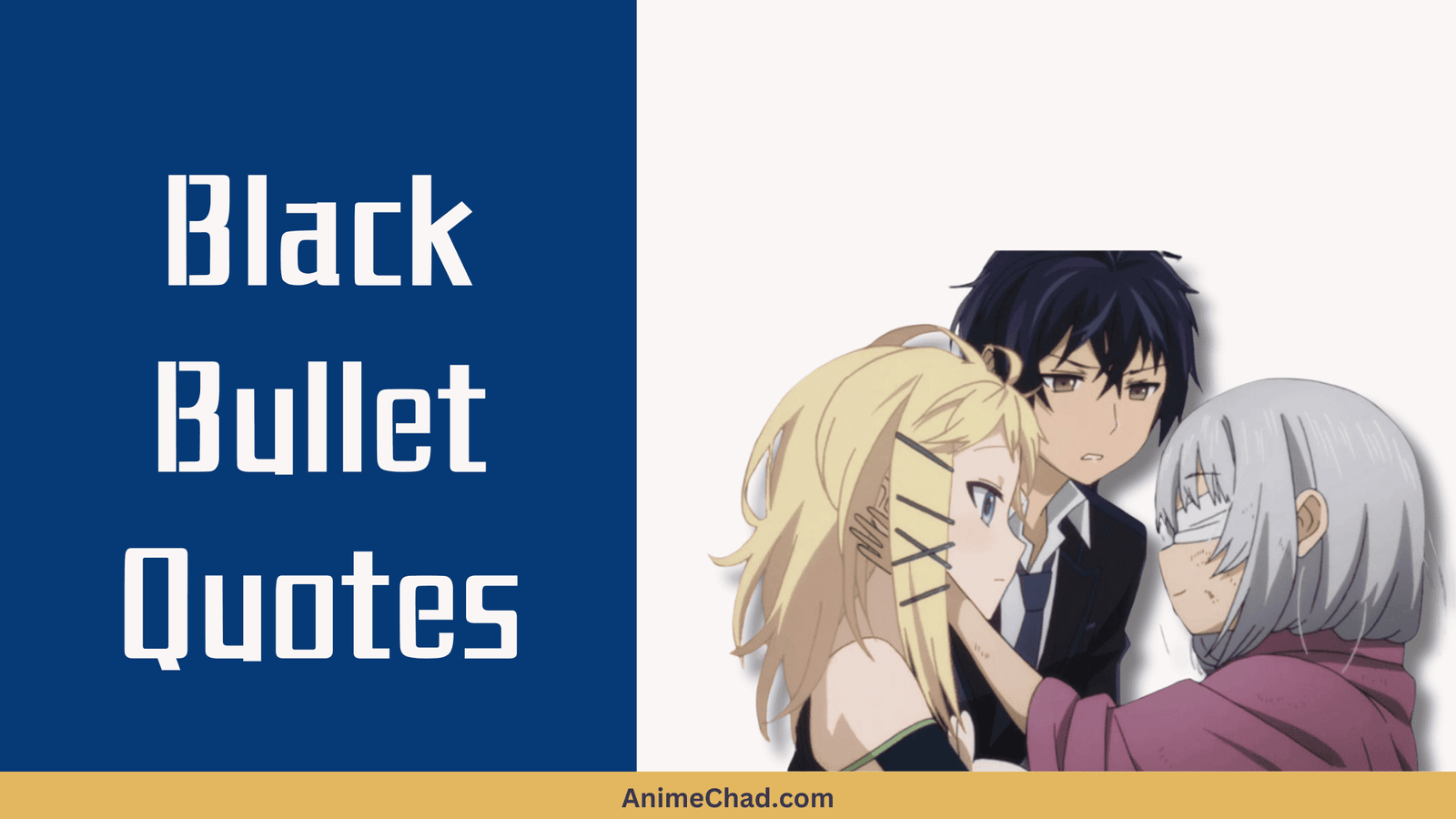Psycho-Pass is a dystopian anime series set in a future Japan where the Sibyl System monitors citizens’ mental states via Psycho-Pass levels to prevent crime before it occurs. It delves into profound themes of justice, free will, human nature, and the ethical costs of a surveillance state.
This curated collection of 25 quotes highlights pivotal moments, character evolution, and the tension between order and chaos across the series’ arcs.
In this world, it’s easy to feel powerless. But remember, your Psycho-Pass is not your destiny—it’s a reflection of choices you can still make
Episode 1 (Crime Coefficient)
Akane Tsunemori
Akane’s debut resolve marks her shift from naive recruit to determined inspector, underscoring the theme of personal agency amid systemic control.
The Sibyl System doesn’t judge intent; it judges potential. But potential for good or evil? That’s up to us humans
Episode 2 (Those with Unstable Psycho-Passes)
Nobuchika Ginoza
Ginoza’s caution to Akane reveals his rigid worldview, foreshadowing his arc of questioning enforcement dogma and embracing empathy.
Justice without mercy is just punishment. True justice balances both, even if it means defying the system
Episode 5 (Those Who Cease to Be Criminals)
Shin’ya Kogami
Kogami’s reflection during a hunt exposes his internal conflict, highlighting the series’ exploration of vigilante morality versus institutional rigidity.
A clear Psycho-Pass isn’t happiness; it’s suppression. Real freedom means facing the mud inside ourselves
Episode 8 (And the Invisible Fear)
Shogo Makishima
Makishima’s philosophical taunt to Akane challenges Sibyl’s facade, embodying the antagonist’s role in sparking her growth toward moral complexity.
Enforcers like me are just tools, but tools can choose how to be wielded—sharply or with restraint
Episode 3 (Those Who Guard the Minds of Others)
Tomomi Masaoka
Masaoka’s paternal advice to Kogami during a stakeout illustrates his redemption arc, tying into themes of latent criminality and second chances.
If Sibyl is infallible, why do we need doubt? Because doubt is what makes us human, not machines
Episode 11 (The Place Where Justice Belongs)
Akane Tsunemori
Akane confronts Ginoza in a tense interrogation, signifying her evolution from follower to ethical leader, critiquing blind faith in technology.
Crime isn’t born from hue; it’s forged in the cracks of a society that ignores suffering
Episode 7 (Symbol of Justice)
Shogo Makishima
Makishima’s manifesto during a broadcast incites chaos, driving the plot’s anti-Sibyl theme and forcing characters to confront societal illusions.
Loyalty to the badge means nothing if it chains your soul. Break free, or become the monster you hunt
Episode 10 (Happy Dreams)
Shin’ya Kogami
Kogami’s warning to a fellow enforcer amid a raid underscores his descent into obsession, connecting personal vendettas to broader justice failures.
In a world of clear hues, the cloudy ones like me remind you that perfection is a lie
Episode 4 (Nobody Knows Your Face)
Yayoi Kunizuka
Yayoi’s quiet admission to Akane during downtime reveals her past trauma, emphasizing themes of identity and the human cost of enforced clarity.
Sibyl promises safety, but at what price? A cage of glass where hearts can’t beat freely
Episode 13 (Surrendering the Phoenix)
Akane Tsunemori
Akane’s final plea to Makishima in the season climax cements her as a symbol of resistance, blending hope with the arc’s critique of totalitarianism.
Revenge doesn’t clear your Psycho-Pass; it stains it deeper. Choose forgiveness, or lose yourself
Episode 14 (Unfit / Those Without Crime Coefficients)
Mika Shimotsuki
Mika’s conflicted counsel to a latent criminal highlights her early idealism, foreshadowing her arc of grappling with enforcement’s moral gray areas.
he system sees threats, but misses the beauty in imperfection. That’s why artists like me exist—to shatter the mold
Episode 16 (The Holy Night)
Shusei Kagari
Kagari’s lighthearted yet profound chat with Yayoi during a peaceful holiday moment contrasts battle intensity, tying into themes of creativity versus control.
Dominators fire on hue, not heart. But I aim for the truth beneath, even if it dooms me
Episode 18 (The Mechanism of Murder)
Shin’ya Kogami
Kogami’s solo pursuit in a high-stakes chase reveals his rogue evolution, underscoring the series’ tension between legal justice and personal retribution.
Friendship in this world is rare—don’t let Sibyl’s numbers define who you trust
Episode 20 (The Verdict Is Yours)
Nobuchika Ginoza
Ginoza’s evolving bond with Kogami during a joint operation marks his shift from skeptic to ally, exploring loyalty amid systemic betrayal.
A clear society breeds hidden rot. Only by exposing it can we grow, painfully but truly
Episode 22 (The Masks Beneath)
Shogo Makishima
Makishima’s dying words to Akane encapsulate his anarchic philosophy, driving the season’s climax and her deepened resolve against flawed utopia.
Therapy isn’t weakness; it’s the weapon against a system that criminalizes our minds before we act
Episode 15 (The Stigma of Genius)
Tomomi Masaoka
Masaoka’s reflective talk with a patient in a quieter therapy session highlights his empathetic side, balancing action with the theme of mental health reform.
Power corrupts not the wielder, but the system that hoards it. We must decentralize to survive
Episode 19 (Duration of Each Dream)
Akane Tsunemori
Akane’s strategic debrief post-battle signifies her leadership growth, connecting to the arc’s examination of distributed justice over centralized control.
In the quiet after the storm, we rebuild—not with Dominators, but with understanding
Episode 21 (The Deepest Pool in the World)
Yayoi Kunizuka
Yayoi’s post-mission solace with Kagari offers a peaceful counterpoint, illustrating her arc from isolation to connection in a divided society.
Hunting ghosts of the past won’t save the future. Let go, or the cycle of crime repeats
Episode 17 (Flesh and Iron)
Mika Shimotsuki
Mika’s confrontation with her own history during an investigation reveals vulnerability, tying into themes of inherited trauma and breaking chains.
Sibyl’s judgment is cold math, but humanity thrives on the warmth of flawed decisions
Episode 23 (The Future Is in Our Hands)
Shin’ya Kogami
Kogami’s farewell to Akane after his exile moment blends loss with empowerment, emphasizing free will as the antidote to deterministic fate.
ven in isolation, the spark of rebellion lives. Never underestimate a single clear mind
Episode 12 (The Place of Conviction)
Joji Futaba
Futaba’s tech support from hiding during a key op highlights unsung heroes, reinforcing the series’ nod to collective resistance against oversight.
Battle scars fade, but the lessons of mercy endure, shaping enforcers into guardians
Episode 9 (Love Is Like a Battlefield)
Tomomi Masaoka
Masaoka’s advice post-skirmish to a young enforcer underscores his mentorship role, linking combat to the theme of compassionate policing.
Villains aren’t born; they’re sculpted by a world that measures worth in hues alone
Episode 6 (Return of the Sinner)
Shogo Makishima
Makishima’s manipulation of a pawn in a scheme exposes societal engineering, propelling the antagonist’s influence on characters’ ethical dilemmas.
Peace isn’t absence of crime; it’s the courage to question why it exists
Episode 24 (What Is Justice?)
Akane Tsunemori
Akane’s closing monologue in Season 2’s arc finale solidifies her as the moral compass, weaving personal growth with the critique of perpetual surveillance.
In the end, our Psycho-Passes may cloud, but our choices keep the light of humanity burning
Episode 22 (The Day of Revolution)
Nobuchika Ginoza
Ginoza’s redemptive stand in a climactic revolt marks his full transformation, balancing the series’ hope amid dystopian despair.


